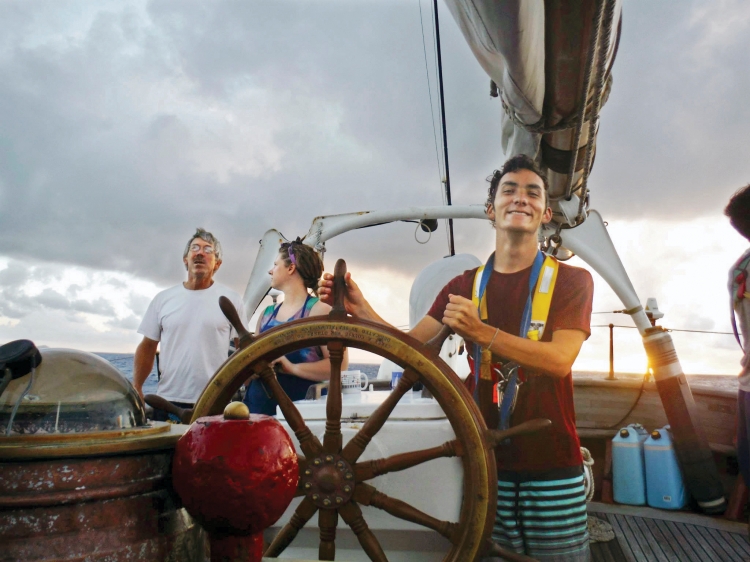
By
While his Boston College peers endured the snowiest winter on record this semester, junior Samuel Beard set sail for the Caribbean – but not on a pleasure cruise.
One of 18 undergraduate participants in a Sea Education Association (SEA) interdisciplinary study program, he explored global issues of conservation and sustainability in the Caribbean region.
“SEA Semester: Colonization to Conservation in the Caribbean” began in January with study at SEA’s campus in Woods Hole, Mass. Students explored the colonial history of the region by examining historical and archival documents, and gained an understanding of the complex social and environmental issues surrounding the modern Caribbean world.
Beard, a history major with minors in environmental and international studies from Woodland Hills, Calif., dubbed the program “a perfect merger between two of my educational interests. I could not pass up the opportunity to participate in the hands-on educational experience offered by SEA.”
The students acted as both crew and scientists on board the SSV Corwith Cramer, a state-of-the-art ocean research vessel and 134-foot brigantine sailboat operated by SEA.
Though Beard said the experience as a whole was memorable, one particularly special moment came when he was put at the helm during the middle of the night. “I had to use the stars to navigate and had absolutely no business steering anything, especially a massive sailboat full of people in the middle of the ocean. The crew was there to guide me, but I couldn’t help but feel both nervous and excited at the same time.”
The group met the tall ship – their home, campus and classroom for six weeks – in mid-February in San Juan, Puerto Rico. Their studies were furthered at sea through multi-day port stops in the islands of St. Maarten, Montserrat, Dominica, Grenada, St. John and Puerto Rico, where they met with local experts to expand on their research.
Of the rigorous academic program, Beard said: “The first six weeks really pushed [us] with long class hours and independent research projects that set us up for our time on the ship, where our academic workload took on a more hands-on approach as we chose research projects to focus on through our time in the Caribbean.
“The academic work was extremely rewarding and tailored to each student’s individual interests. We also took classes such as nautical science.”
During the voyage the ship resembles a country in itself, according to SEA, as students join a sailing culture steeped in strong customs, speak a traditional maritime language, and have the opportunity to experience life onboard a tall ship.
They processed oceanographic samples, took classes, stood watch in shifts during the around-the-clock schedule, and participated in navigation, science, ship engineering, cooking and cleaning. As a team, they shared responsibility for the ship and each other.
“This program gives these students access to timely, pressing global issues,” said Mary Malloy, a maritime studies professor and one of the program’s initial developers. “I can’t name another region of the globe that has the range of issues that we deal with today – environmental, cultural, economic – as concentrated as you find in the Caribbean.”
Integral to the experience, according to organizers, is training in natural history illustration, journaling and observation. Participants worked with artists and each documented their voyage onshore and at sea through field sketches, recognition drawings and navigational directions, technical diagrams, scientific data recording, personal accounts and storytelling.
“The program is hard work; it is very difficult to adjust to life at sea,” Beard said. “It is important not to romanticize the reality of being at sea and being a part of a crew. [But] I formed a bond with the other students and crew members that can never be broken. Participating in SEA Semester was one of the best decisions of my life and certainly one I will never forget.
“This experience has made me a much more confident student. It has taught me the importance of personal responsibility and the value of being part of a team.”
Sea Education Association is an internationally recognized leader in undergraduate ocean education. For more on SEA, go to www.sea.edu.



